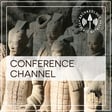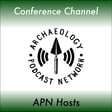Become a Creator today!Start creating today - Share your story with the world!
Start for free
00:00:00
00:00:01

058 - AAA2017 - Shankar
Recommended
Transcript
Introduction to 'Podcasts and Anthropology' Session
00:00:00
Speaker
You're listening to the Archaeology Podcast Network. This is the recording of a paper presented at the 116th annual meetings of the American Anthropological Association in Washington, D.C. on December 1st, 2017. The session was entitled, Podcasts and Anthropology, Exploring Approaches to Multimodal Research and Communications, and was organized and chaired by Nushin Setigasamy and Kyle Olson, both of the University of Pennsylvania.
00:00:29
Speaker
The discussion for this session was Arjun Shankar of the University of Pennsylvania.
Arjun Shankar's Innovative Approach in Anthropology
00:00:35
Speaker
All right. So thanks again to our speakers. And for those of you guys who are going to stick around, please do stick around because we're going to have comments from our discussant, Arjun Shankar, postdoctoral fellow at the University of Pennsylvania.
00:00:50
Speaker
All right. Thank you, guys. This is this is great. I feel like we're at the cutting edge of something in anthropology here. So that's that's amazing for me. I just really briefly about me. I'm a media and visual anthropologist. I think a lot about multimodal research.
00:01:05
Speaker
and what it might do for the anthropological project. But I guess why I want to thank you guys is because it made me think about my fieldwork again very differently. And when I was in the field, I did a lot of photography and filmmaking with students in a school outside of Bangalore. And so that was a very structured process where I would give them cameras, they would go out into their communities and they would
00:01:28
Speaker
Document their lives and I thought this was really the way that I was gonna learn something about them But I had during my field work. I had one audio recorder, which I really kept for myself all the time I don't want anybody else to use it because of course it was my way of collecting interview data, right? So I would go out I would interview people I would put them I would put it out just in the in the field to hear things differently and every once in a while Some students would steal my audio recorder
Impact of Audio on Students in Fieldwork
00:01:56
Speaker
They would take it for themselves when I wasn't looking because they were interested and curious about what this other device was. And so they would go out with it. I would look frantically for it, thinking I'd lost it. And then within two or three days, it would come back. And they would say, they would laugh at me for like thinking that they had stolen it and then give it back. And then I would listen to the audio with them.
00:02:17
Speaker
just like I would listen to the foot, just as we would see the photographs and watch the films. And what always struck me about that was how much more interested they were in hearing themselves than seeing themselves. And I think that really for me is a profound way of thinking about what
00:02:34
Speaker
voice and sound is. The fact that even though I thought from an ocular-centric perspective that that's what everybody wants to feel, it was the sound that made them feel something. And then there was one particular audio clip that I always listen to over and over again and I share with my colleagues and we never know what to do with it.
Linking Voicing to Global Subject Positions
00:02:56
Speaker
One student in a five second clip
00:03:00
Speaker
says to no one in particular, or maybe to somebody in particular, hello Americans, this is Adersha here. And he says it again, hello Americans, this is Adersha here. And I've been trying to figure out what to do with that particular clip for about three years now. And
00:03:19
Speaker
What this panel has made me think about is how voicing provides a particular kind of subject position. And in this case, I think what he's trying to do is create and produce a global subject position for himself through voicing. And I think that is one way of starting to think about what an anthropological methodology for podcasting might be. What kind of subject positions are produced when we're voicing?
00:03:45
Speaker
and towards who. And so I think what I'll just do really briefly because I really want Q&A, I think a panel like this deserves a Q&A, is just to think about some of the oral regimes that we have to reckon with if we want to think about the subject positions we're producing and maybe challenge them.
Oral Regimes and Power Dynamics in Archiving
00:04:02
Speaker
So the first, which comes up a lot in Chris's talk, is an oral regime which has to do with archival practice. And typically we think about archival practice as textual, right? The colonial archives were almost entirely textual.
00:04:18
Speaker
But now with digital processes, we can think about multimodal archiving in a very different way. But what I think about when I think about archiving is Anne Stoller's work and her reminder that archives are never things but processes. And so what I would think about with Chris is
00:04:37
Speaker
What kinds of power differentials shape what you can store, what you are categorizing, especially when we're thinking about those who are rendered marginal, either in the archaeological sense, in the past, or in the present tense, how does that change the way we want to think about the repository of voices? And how does that change the way we want to even store voices and whose? So that's the first kind of oral regime.
Journalistic Biases in Anthropological Podcasting
00:05:00
Speaker
The second, as you bring up Ariel, is about the traditional journalistic practice, which I think we are always reckoning with. And as you point out, there's a kind of pragmatic aspect of journalistic practice, meaning how do we get funds, which came up a lot. But then also the ethical, do we make our sources explicit?
00:05:19
Speaker
And of course, I think the way we hear journalists generally is as unbiased. And that's something that we as anthropologists always have to reckon with because there is, of course, in the larger publics that we want to discuss our work with a kind of fetishization or romanticization of the objective. So it seems to me that if we're going to think about anthropological podcasting, we have to reckon with this romanticization of the object.
00:05:46
Speaker
And I really do like the way you're talking about how sound can allow for play and a kind of pushback against the tendency towards an unbiased view in your paper. But my question is how does radio's playfulness function in a post-truth moment? When actually do we really want to be playing that much at this moment or we want to go back to actually talking about facts?
00:06:10
Speaker
And the other piece about that is if, as you say, most people are choosing podcasts that fit their predetermined interests, to what extent do journalistic versions of podcasting actually really challenge oral regimes at all? Or are they just merely reinforcing them?
Integrating Listening Practices in Anthropology
00:06:28
Speaker
And then, of course, there's the actual podcast genre itself, which I think all of you spent most of your talks on. How long should it be to get to larger publics? What kind of voice is necessary? And how does that really work in productive tension with the jargon of anthropology, which came up really nicely, with anthropological ways of listening? And of course, we know that anthropologists are always
00:06:56
Speaker
learning in sound. We listen very closely. We listen to ticks, movements, all the time. And so how can we actually bring that in to push against the podcast genre, I think is right there for us to think with. And then finally, I think for me,
Podcasting for Professionalization and Control in Learning
00:07:14
Speaker
The most interesting part of these papers is podcasting as a professionalization process for young anthropologists. Clearly, graduate students, when they're coming through, and I'm not that far away from that, feel very out of control of their learning.
00:07:32
Speaker
And it seems to me that in all of these cases, what the podcast allows us to do is take control of that learning, to take it in a direction that moves beyond whatever the precepts of what precepts of learning are in our departments. So that to me is fantastic. And I would ask you all to maybe like push that further and think with me about how we can make that constitutive of how we learn in the academy.
00:07:57
Speaker
Second part of that is undergraduate learning. Clearly we're all thinking about that at some level in all my classes. They have to do some sort of multimodal and product. So if we're not training ourselves to do this work, then what are we able to do for them? So I really enjoyed that about your papers and thank you. And then we'll open it.
Session Conclusion and Contact Information
00:08:14
Speaker
There was a question and answer period that followed this discussion and session. However, no microphone is provided. So the audio was not usable. Thank you.
00:08:22
Speaker
This has been a presentation of the Archaeology Podcast Network. Visit us on the web for show notes and other podcasts at www.archpodnet.com. Contact us at chrisatarchaeologypodcastnetwork.com.

